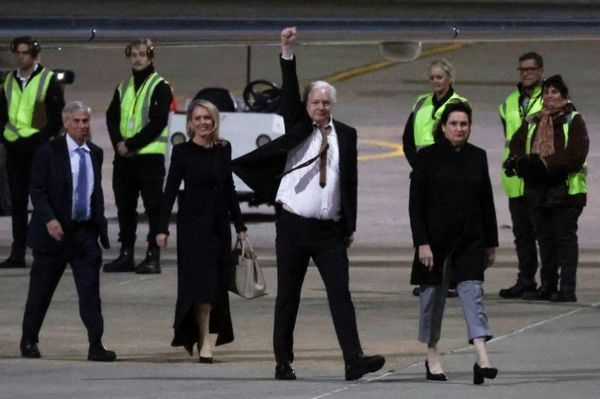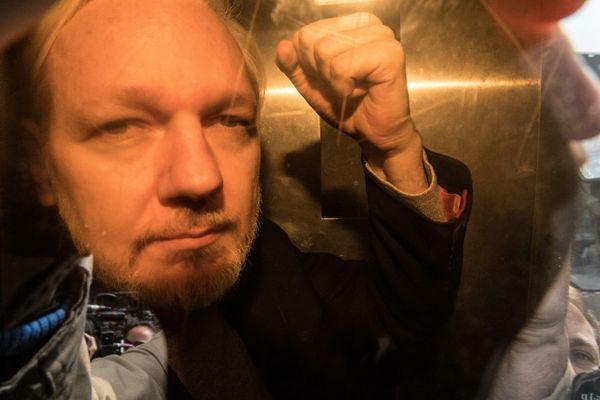
ASSANGE’S ISLAND HOLIDAY
The news is abuzz with stories of Julian Assange’s imminent release, with the WikiLeaks founder set to enter his guilty plea for a single charge on the remote island of Saipan in the middle of the Pacific, the ABC reports. The Northern Mariana Islands are the closest US territory to Australia and will be Assange’s final pit stop on his way to freedom. It’s been 14 years since WikiLeaks first published classified US defence documents alleging war crimes in Afghanistan and Syria — Assange was understandably reluctant to go to mainland USA, given he once faced a sentence of up to 175 years in prison or a potential death penalty.
He will now be sentenced to only 62 months and will be released on time served. The Guardian reports that Assange’s last moments in London’s Belmarsh prison were executed farcically, with 40 police, a helicopter and six police vehicles guarding him on his way to the airport. “What on earth did they envision? That he will abscond on his way to freedom?” asked Kristinn Hrafnsson, Assange’s friend and editor in chief of WikiLeaks.
While Assange’s release has mostly been met with positive reactions, some remain angry at the length of his incarceration and worried about what his guilty plea means for journalists, SBS reports. “Julian has effectively had to plead guilty to an activity that’s the kind of activity that journalists globally perform — day in, day out, in the public interest — and obviously that is problematic,” said chief executive of the Committee to Protect Journalists Jodie Ginsberg.
RENEWABLES, NOW
The Australian Energy Market Operator (AEMO) says we need to double the amount of renewable energy capacity currently being installed each year if we want to make net zero by 2050, The Australian reports. AEMO’s 2024 Integrated System Plan (ISP), which doesn’t include the Coalition’s nuclear strategy due to the fact nuclear power is currently banned under federal law, says that the urgent delivery of renewable energy infrastructure is needed if, as expected, most coal-fired power stations are offline by 2035. “There is a real risk that replacement generation, storage and transmission may not be available in time when coal plants retire, and this risk must be avoided,” said AEMO chief executive Daniel Westerman.
There is no chance that nuclear power would be ready in time, Guardian Australia points out, and delaying the renewable rollout for a nuclear option would only lead to higher prices. “[The] time it would take to design and build nuclear generation would be too slow to replace retiring coal-fired generation,” AEMO wrote in a factsheet accompanying its ISP. Energy Minister Chris Bowen suggested that the exorbitant cost of building nuclear reactors could “add $1,000 a year to people’s energy bills”.
Clean Energy Council chief executive Kane Thornton drew a connection between the AEMO ISP and the recent CSIRO GenCost report, saying it “confirms what we already know … While the rate of renewables is not where it needs to be today, we are confident that governments and industry are working together to continue to unlock the barriers to investment.”
ON A LIGHTER NOTE…
It’s a miracle! A 13-year-old boa constrictor, previously thought to be male, has given virgin birth at City of Portsmouth College, according to the BBC. “Ronaldo“, a Brazilian rainbow boa constrictor, gave birth to 14 tiny snake babies despite having no contact with a mate in the nine years she’s been cared for by her human, animal care technician Pete Quinlan.
“I raced down here to see what was going on and low and behold there were baby snakes everywhere,” Quinlan said, having been alerted to the immaculate conception by a student. Apparently, it’s rare but not impossible for vertebrates to conceive asexually, which they do by cloning themselves, resulting in genetically different offspring. A male snake in the neighbouring enclosure told reporters that the babies “look nothing like me”, before refusing to anssssswer any further quesssssstions.
Say What?
The Australian Labor Party’s policy platform recognises both Israel and Palestine. We cannot believe in two-state solutions and only recognise one.
Fatima Payman
The West Australian Labor senator explains why she crossed the floor in support of Palestinian statehood.
CRIKEY RECAP
“The last actual Liberal leader was Malcolm Turnbull, who was hemmed in and then ousted by right-wingers and climate denialists backed by the sectional socialists of the National Party. The Morrison government — putting aside the pandemic spending — permanently increased the size of government in Australia to over 26% of GDP compared to below 25% under Turnbull. Morrison’s energy policy, such as it was, consisted of trying to prop up coal-fired power and subsidise gas — not to mention Morrison undermined several tenets of Australia’s basic system of government with his secret self-appointments to ministries.
On coming to the leadership, Peter Dutton backgrounded the media that he was far less right-wing than he was portrayed as — hadn’t he, after all, devised the plebiscite as the way to get marriage equality through under Turnbull? But while Dutton as an MP predates the merger of the Liberal and National parties in Queensland, he is the perfect representation of that political union — which is the socialism and populism of the Nationals masquerading under the Liberal name.”
“Kean, 42, is a career politician who joined the Liberal Party as a teenager and was appointed president of a local Young Liberal branch as a 20-year-old in 2002. Three years later he attained a Bachelor of Business from the University of Technology, Sydney, where he was elected to the student representative council. He worked as an adviser to the Liberal state opposition leader John Brogden in his early career, and also had a brief stint as an accountant at PwC.
He was elected to the safe Liberal state seat of Hornsby in 2011, the year the Coalition defeated the 16-year incumbent Labor government in a landslide, and quickly rose through the parliamentary ranks. Within four years, he had been appointed a parliamentary secretary, and in 2017, the state’s new premier Gladys Berejiklian made him minister for innovation and better regulation. But it was after 2019, when he was appointed minister for energy and environment, that he began amassing a greater political profile. In that role, he succeeded in getting cross-party support for a long-term plan to boost green electricity generation in the state, known as the NSW energy infrastructure road map.”
“It’s still early days for this setup and the results are still clearly bad. But how long will it take for these AI results to be ‘good enough’ for most?
Individual commercial deals between tech companies and publishers have their flaws, and to date are on shaky ground, such as those facilitated through the Australian news media bargaining code. But tech companies require credible, professional news and public interest journalism to legitimise their platforms as having accurate, informative content. Without it, they become cesspools for conspiracy theories, hearsay and hate speech (like X, the platform formerly known as Twitter, has become), or forcibly saccharine and superficial like Meta’s Threads, which tries to avoid news and ‘political content’ altogether.
But these arrangements continue to be significant as long as audiences use those platforms as sources of news and information — so that we don’t devolve into a society paralysed by misinformation and unable to distinguish fact from fiction.”
READ ALL ABOUT IT
Heat is killing thousands, and big events have not adjusted (The New York Times) ($)
Emmanuel Macron claims ‘extremes’ could lead ‘to civil war’ (euronews)
Israel’s Supreme Court orders conscription for ultra-Orthodox men (Al Jazeera)
Protestors storm Kenya’s Parliament as MPs pass finance bill (africanews)
Trump handed plan to halt US military aid to Kyiv unless it talks peace with Moscow (Reuters)
THE COMMENTARIAT
My own prison ordeal gave me a taste of what Assange may be feeling. He’s out — but the chilling effect on press freedom remains — Peter Greste (The Conversation): “My own ordeal in Egypt, where I was imprisoned on terrorism charges in 2014-15, was nothing compared to Assange’s, but it was more than enough to understand the crushing mental and physical burden that incarceration imposes on inmates. And I also understand the weird blend of elation, confusion and disorientation that sudden release brings. Assange’s journey home will be much longer than his flight back to Australia.
But Assange’s release does not end the questions this whole saga raised in the first place. It began when his company, WikiLeaks, published a series of documents exposing evidence of war crimes and abuses by the US government in Iraq and Afghanistan. WikiLeaks was doing what the First Amendment to the US Constitution was designed to achieve. It guarantees freedom of speech and press freedom, and in the process it grants people the right to speak out against abuses of government authority. That is a vitally important check on the awesome power that governments wield, and WikiLeaks should be celebrated for what it exposed.”
Alarms will be sounding at Qantas, but not in the cockpit — David Evans (the SMH): “It seems that Qantas and its new chief executive, Vanessa Hudson, have been doing a lot of apologising lately. And so they should, with the latest World Airline Awards showing our national carrier’s decline from fifth in 2022, to 17th in 2023, to a new low of 24th in the latest results. When an airline descends that rapidly, alarms usually go off: not in the cockpit, in the boardroom.
The Skytrax World Airline Awards have been described as the Oscars of the aviation industry. So it’s not as though Qantas can look at this result and shrug its shoulders. Instead, it should roll up its sleeves. The bad result is hardly surprising, with the airline flying from one bad news story to the next of late. No need for a passenger manifest of gripes here; a brief summary would include illegally sacking 1,700 ground crew during the pandemic and selling seats on non-existent ‘ghost flights’.”











